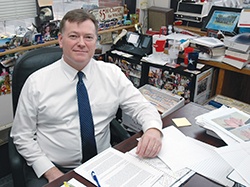Prosecutor Threets Docket Includes Kids, Community
by March 3, 2014 12:00 am 233 views

If you want the low-down on a prosecutor, you ask his natural adversary: the defense attorney.
And in this region, the tone among defense attorneys is favorable when you ask about John Threet, in his eighth year as prosecutor for the Fourth Judicial District, which includes Washington and Madison counties.
Here is what they say about Threet, 49, a Fayetteville resident and father of two teenagers, who descends from three generations of Baptist preachers: he’s effective, careful and fair.
“He takes it damn serious,” said local attorney W.H. Taylor. “John still believes that people are basically good, and that’s refreshing.”
Threet joined the prosecutor’s office in 1993. After five years, he was named chief deputy prosecutor under Terry Jones, and in 2004 he was honored as a member of the Northwest Arkansas Business Journal’s Forty Under 40.
Since then, he has twice been elected prosecutor. He has conducted 109 jury trials — including two where he successfully sought the death penalty — and recently he announced his candidacy for circuit judge in the Fourth Judicial District.
After more than two decades, Threet is not jaded by the work of confronting murderers, rapists and burglars. He remains unguarded in conversation, maintains his humor, and keeps a rigorous schedule speaking to schoolchildren and civic groups.
“The job hasn’t changed me,” Threet said. “I hear from a lot of people that it’s almost a paradox, the way I act and what I do. There is a stereotype for someone who prosecutes murderers. But I don’t see a paradox in holding people accountable and being lighthearted in other situations.”
Thousands of Washington County children have participated in what Threet called his “own personal scared-straight program — without all the cussing.”
“A huge advantage of this position is that I get to speak to others, and I love speaking to school kids. I show them pictures of cases and discuss what happened and explain the bad effects of drugs, alcohol and of being a bully. I tell them, ‘Here’s a result of letting bad choices run your life.’”
Threet carries a few Presidential $1 coins in his pocket and will use one to surprise a child he sees acting politely.
“It doesn’t cost you anything to be more nice,” he said. “With certain people you have to be more pointed, and, yes, I get worked up in an argument, but it’s not for show. My deputies understand this is a public office and they should never be demeaning. That even means toward the defendant.”
Threet graduated from the University of Arkansas School of Law and worked three years as a deputy public defender. When he joined the prosecutor’s office in 1993, the office had only four deputy prosecutors.
“It was really unmanageable,” he said of staffing back then. By the time he took over as prosecutor, the office had 14 deputies, and he’s managed with that number since.
Changes he implemented include having deputy prosecutors make filing decisions. One deputy used to make them all, but the new method allows more attention to be given to critical decisions at the inception of each case, he said.
He also hired a deputy who understands finance and has an accounting background, David Bercaw. “He is tremendously helpful when we have embezzlement cases,” Threet said.
So what’s the toughest aspect of Threet’s job? It’s not the subject matter, or the grueling hours. It’s having to tell a victim and/or his family that charges won’t be filed, usually because a case can’t be proved.
“That’s hard, when you don’t feel you should move forward, and you have to explain that you’re not. Everyone might feel certain the person did it, but most of the time it’s a matter of proving.”
Taking ultimate responsibility for that decision brings the most stress, Threet said. Prosecutors must examine all facts, circumstances and both sides of a case carefully.
“There’s a lot of reading, stress and pressure in what I do, but it’s often interesting. People ask me, how do you do this over and over again? Dealing with dead bodies? It’s my faith,” he said.
